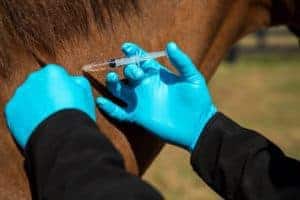
Equine Vaccination Cheat Sheet
Learn about the American Association of Equine Practitioners’ recommended core and risk-based horse vaccines in this handy special report. Sponsored by Boehringer Ingelheim.

Learn about the American Association of Equine Practitioners’ recommended core and risk-based horse vaccines in this handy special report. Sponsored by Boehringer Ingelheim.

Confused by the various vaccine types, schedules, and administration routes for horses? Here’s what you need to know.

The guidelines make new recommendations for core and risk-based vaccines for horses. The committee further emphasizes that routine vaccinations are considered essential during the COVID-19 pandemic.

They might be small, but these flying fiends can spread some deadly diseases.

These pests can transmit a variety of dangerous pathogens, depending on certain factors in your region.

Dr. Steve Reed shares what owners need to know to protect their horses from Eastern, Western, and Venezuelan equine encephalitis.

Use this four-step plan to keep equine infectious diseases in check.

Of the 274 respondents, 201 (73%) said they are most concerned about West Nile virus.

Dr. David Horohov, UK Gluck Equine Research Center director, gives a overview of vaccines and explains their importance.

Discover what diseases your horse can catch from other animals, big and small.

Here’s a rundown on our arsenal of equine disease-fighting drugs and their proper uses.

As of July 30, three and five Texas horses have tested positive for WNV and EEE, respectively, so far this year.

Following floods, Texas animal health officials say mosquito-borne disease incidence could increase.

The World Organization for Animal Health?s (OIE) standards help prevent the spread of infectious disease.
The recording of TheHorse.com’s Ask the Vet LIVE event on mosquito-borne diseases from August 30, 2012, is now

Mosquitoes are more than just annoying, blood-sucking pests—they also carry infectious diseases that can incapacitate or kill your horses.
Stay on top of the most recent Horse Health news with
© 2022 Copyright Statement dolor sit amet, consetetur sadipscing User Terms, sed diam nonumy eirmod tempor invidunt ut labore et dolore magna aliquyam erat, sed diam voluptua. At vero eos et accusam et justo duo dolores et ea rebum. Stet clita kasd gubergren, no sea takimata sanctus est Lorem ipsum dolor sit amet.
"*" indicates required fields